It’s been just over a month since Hurricane Irma hit Florida, and it won’t be forgotten in Florida by anyone anytime soon, especially not by those in the insurance industry.
The powerful storm made landfall first in the Florida Keys as a category 4 hurricane on Sunday, Sept. 10 with 130-mile per hour winds. It then worked its way north, leaving its mark on most of the state, passing from the east to the west coasts.
In the immediate aftermath of the storm, 13 million residents were without electricity and for many it was days or longer before power was restored.
Storm damage loss estimates by catastrophe modelers have ranged between $25 to $65 billion. The Florida Office of Insurance Regulation (OIR) reported total estimated insured losses at more than $5.3 billion as of Oct. 20, with more than 646,000 homeowners claims and almost 42,000 commercial property claims.
As it does after a hurricane or other disaster, the insurance industry got right to work, helping customers recover from the catastrophe, fulfilling the promises for which they paid all those premiums.
Many of those responsible for doing that recovery work for insureds were themselves victims of Hurricane Irma, and they faced a significant challenge: How to help their customers when they and their employees also needed help.
Insurance Journal set out to find out how these industry professionals juggled responsibilities to their customers, their businesses and their families. These are a few of the stories of those who didn’t let their personal troubles stop them from helping their customers after Hurricane Irma.
Brightway, Fort Caroline, Jacksonville, Fla.
Brightway Agency Owner Bobby Raymond and his staff had evacuated their office in Jacksonville, Fla., on the Friday before Hurricane Irma hit. Raymond brought his laptop to a home he owned just outside of the area so he could work remotely with power from a generator and he planned to handle customer claims from there.
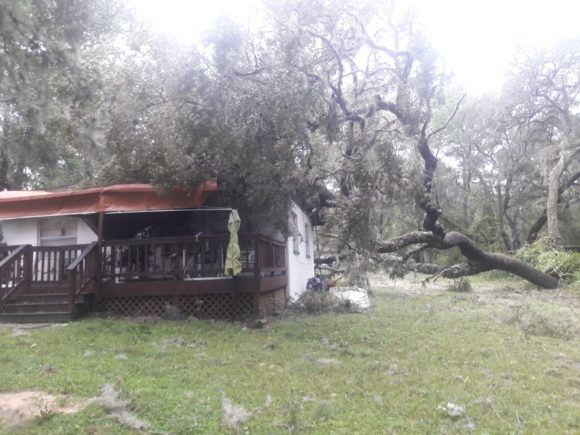
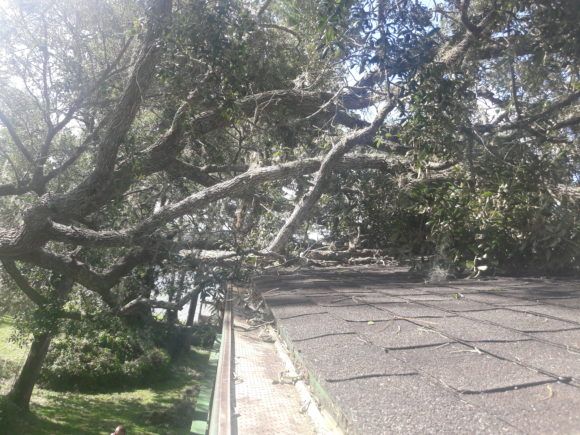
In the early morning hours of Monday, Sept. 11, strong winds caused an oak tree to fall on a rental house Raymond owned next door to where he was staying. Later that day, another oak tree that had been leaning over his house because of the storm fell on top of his roof, sending limbs through the second story of the house.
Raymond said for two days he stayed on the first floor of the house with his son and friends – and a tree on the roof – working with his agency’s affected customers until he lost internet service.
That Wednesday, Raymond was able to get a tree service out to his property, but the shortage of claims adjusters in Florida slowed his own insurance claim. His adjuster said it would be a month before they could get out him.
“They all have a long list of claims to get to,” he said.
The City of Jacksonville, located on the northeast side of Florida, experienced significant and unexpected flooding around St. Johns River from Irma as well, so Raymond had many customers affected by the storm.
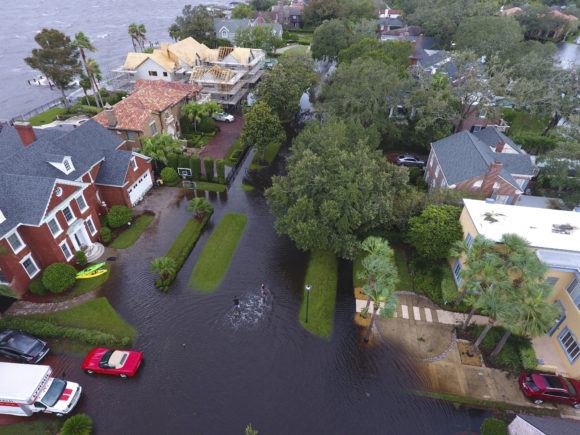
“That was a big surprise. Flood Zone X areas actually flooded – areas that hadn’t flooded before,” he said. “It was just a function of how the storm surge worked and a low tide, so the river wasn’t able to empty out.”
Raymond’s agency processed about 100 claims out of its 2,500 policies. Since he lost internet and phone service, many of Raymond’s calls were handled through Brightway’s customer service center.
One of Raymond’s most memorable clients after the storm was a permanently disabled Iraq War Veteran named Gary Boggs. Despite flooding in his own apartment, Boggs was driving around in his jeep, taking assisted living facility residents to the grocery store and to get supplies. While he was running all over the area helping people, he called Raymond – his agent – to figure out what to do about his flooded home.
“I told him we needed to get a drying company out there as quickly as possible,” he said.
Raymond referred him to a number of companies and the one Boggs was able to get in touch with said they wouldn’t be able to make it to his home for a week. Luckily, Raymond had a contact there to whom he explained Boggs’ story and the work he was doing in the community.
“I said ‘If you can do anything to move him to the top of the priority list, and if anyone deserves it, he certainly does.’ Within 30 minutes they got a team that had traveled from California to his home and got started on everything right away,” he said. “I have plenty of customers with claims, but he is kind of special. I was really happy we were able to get them in.”
Raymond was also able to help Boggs line up contractors to start repairs to his damaged home. The other good news for Boggs: he had flood insurance, thanks to Raymond.
“I spent a lot of time teaching him about it and told them they were close to the river and needed flood insurance,” Raymond said. “A flood adjuster got there within a couple days after Irma and approved all of his services and drying, and released a check to him to get things started.”
Raymond said it was rewarding working with customers to get them back on their feet in the aftermath of Irma, even while dealing with his own hurricane drama.
“It’s a good feeling when you spend all this time selling insurance policies, and then when it comes time to protect the people you are trying to protect, to be able to tell them ‘Yes, you are covered, here’s the number and let us know how we can help or if you don’t understand let us know.’ People appreciate that,” he said. “So, for me, it has been really hectic, and I’ve been really busy and stressed, but it’s a good feeling to be able to help your insureds and know you’ve done it right … that’s what we are in the business for.”
Gulfshore Insurance, Naples, Fla.
Naples, Fla.-based Gulfshore Insurance, an independent agency with 130 employees in five offices in the state, held its extensive annual hurricane preparedness test to go over the agency’s emergency plans just a month or so before Hurricane Irma made landfall.
Gulfshore President Brad Havemeier said that exercise is important for an agency located in a hurricane exposed area, especially since the region hadn’t experienced a significant storm in 15 years.
“We wanted to make sure that people were prepared,” he said.
But once Hurricane Irma began its path towards Florida the first week of September and projections about the storm’s strength and track became more dire, employees of the agency understandably began to fear for their own safety and the safety for their families.
“You can’t prepare for the fear and concern people feel for their own life safety. People have different degrees of comfort,” Havemeier said.
Havemeier said he made the decision to the close the Naples office Sept. 8, the Friday before Irma made landfall, to allow staff to prepare or evacuate their own homes.
Still, Gulfshore kept its customer service line open over the weekend and the 25 to 30 employees who remained answered calls and responded to clients, Havemeier said.
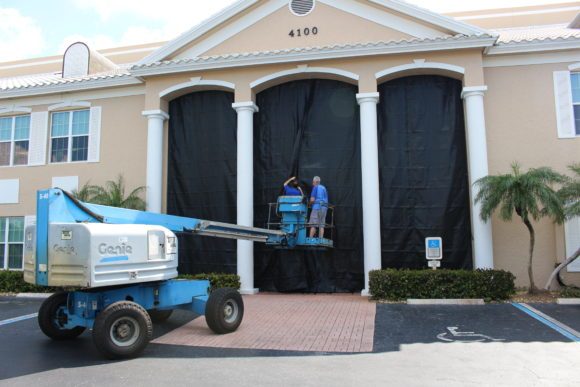
“When you are in the customer service business, you have to respond. But when you have a skeletal staff it can get a little overwhelming,” he said.
Naples, on the bottom West Coast of Florida, took a direct hit from Irma on Sept. 10 and experienced significant flooding. Havemeier said Gulfshore’s Naples office sustained some minor building damage from the 140 mph winds. The area of Marco Island, where Gulfshore also has an office, experienced catastrophic damage, and the agency’s office there remains closed.
But the Naples office was back up and running on Sept. 12. Havemeier said he found out the office is on the same power grid as the hospital and fire station, so they were one of the first in the area to get power restored. Many Gulfshore employees went without power for a week or more after the storm, and some slept at the office because they could escape the heat with its air conditioning.
Havemeier said the agency had about 10,000 customers affected by Irma, and an adjuster shortage meant carriers could not respond as quickly as they wanted. Communication disruptions from cell towers that were out also slowed service.
He said insurance colleagues from outside of the area reached out to see if they could help his agency.
“It’s good to have that camaraderie,” he said.
He is proud that his agency was able to help customers after the storm despite not having all the usual resources.
“We are here to hold people’s hands and give them the right advice and we have customers who value us for that,” he said. “With the community based insurance agency starting to disappear, you start losing that relationship. You wonder how people will be served.”
Brightway, The Landers Agency, Fort Lauderdale, Fla.
Brightway, The Landers Agency, is located in a flood zone about three blocks from a mandatory evacuation area in Fort Lauderdale. Its owner, Kandie Landers, also owns a Brightway franchise in Denver and just expanded her franchise into Florida back in March.
Landers was working from Denver before Hurricane Irma hit and planned to fly back to Fort Lauderdale to help her staff prepare the office. Instead, she decided to stay behind so she could assist customers with claims in the event of power outages after the storm.
“I had my team get everything out of the office that we could and get stuff off the ground, take laptops and phones home,” she said. “During the hurricane I never lost power in Colorado so I was able to help customers.”
Landers flew back to Florida and returned to her office the Wednesday after Irma, where she found it completely flooded and the air conditioning blown out. Landers and her team, husband, and parents got to work cleaning up the office, all while assisting clients and others who needed her agency’s resources.
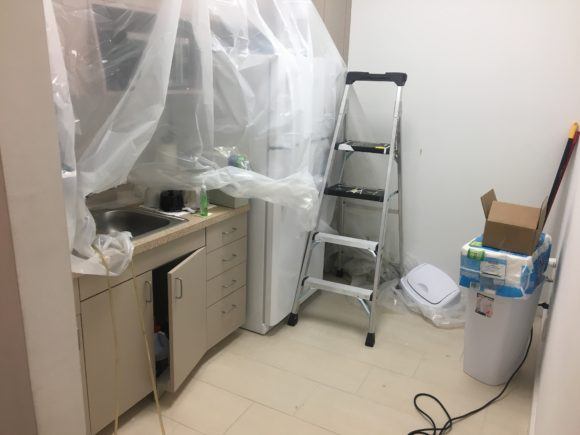
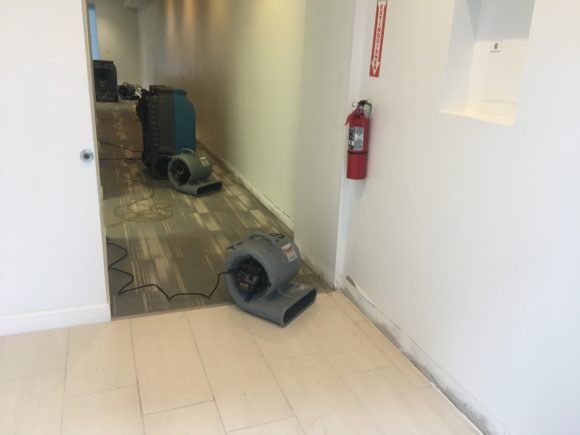
“It was exhausting – both physically and emotionally because we couldn’t help everybody. But we truly tried our best to help everyone we could,” she said.
It was about two weeks of working remotely and cleaning up before Landers could get back into her office.
About one-third of her agency’s 1,400 policies were affected in some way, Landers said, including several clients in the Florida Keys, which suffered catastrophic damage.
“Once that storm is gone, there are demands from clients, mortgage brokers, dealing with day-to-day expectations… they don’t stop. You can’t be as efficient when you aren’t all together in the office,” she said. “It hurts production too. From a business owners’ standpoint, you are sacrificing not only on the product side, but the day-to-day work.”
Landers said the lack of education among Florida residents when it comes to their insurance needs has been “pretty scary.” She said the consultative approach to educating her clients she used in Denver is even more essential in the hurricane-prone state.
“A lot of people don’t know what they have and don’t have, and that’s why it’s our duty to educate them on what they need,” she said.
But Irma helped raise awareness among her clients, who have been calling to thank her since the hurricane because they had the right coverages.
“[Clients] may not always want everything I have or say they need, but my job at the end of the day is to make sure they are protected,” she said. “That was one of the things that really resonated for me through all of this – we are an advisor. We need to advise clients all the way through this.”
And though her first year in Florida has been eventful, she says she doesn’t regret opening her office there.
“We are lucky we didn’t get more damage than we did, and we will move forward and use the experience as an opportunity to educate,” she said.
Topics Catastrophe Natural Disasters Agencies Florida Claims Flood Hurricane
Was this article valuable?
Here are more articles you may enjoy.


 Florida Engineers: Winds Under 110 mph Simply Do Not Damage Concrete Tiles
Florida Engineers: Winds Under 110 mph Simply Do Not Damage Concrete Tiles  US Supreme Court Rejects Trump’s Global Tariffs
US Supreme Court Rejects Trump’s Global Tariffs  Lemonade Books Q4 Net Loss of $21.7M as Customer Count Grows
Lemonade Books Q4 Net Loss of $21.7M as Customer Count Grows  Viewpoint: Runoff Specialists Have Evolved Into Key Strategic Partners for Insurers
Viewpoint: Runoff Specialists Have Evolved Into Key Strategic Partners for Insurers 

